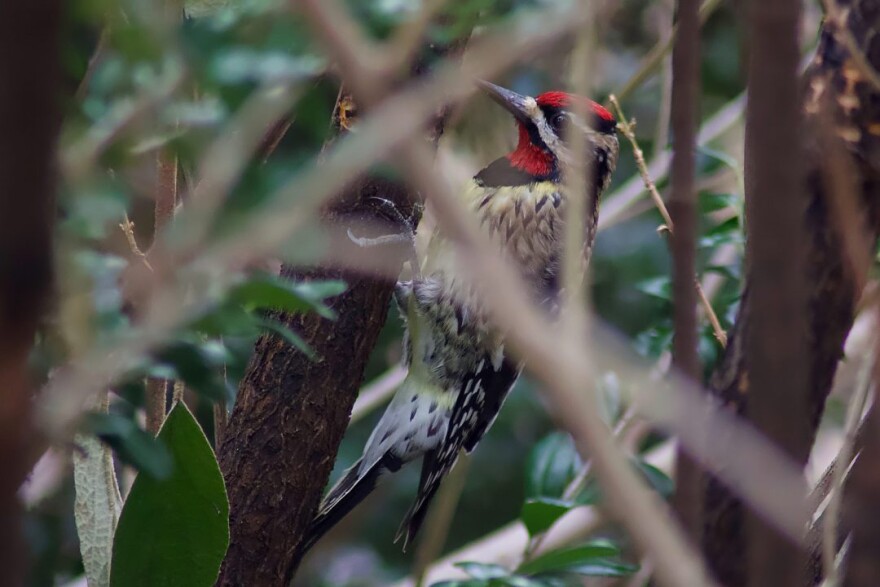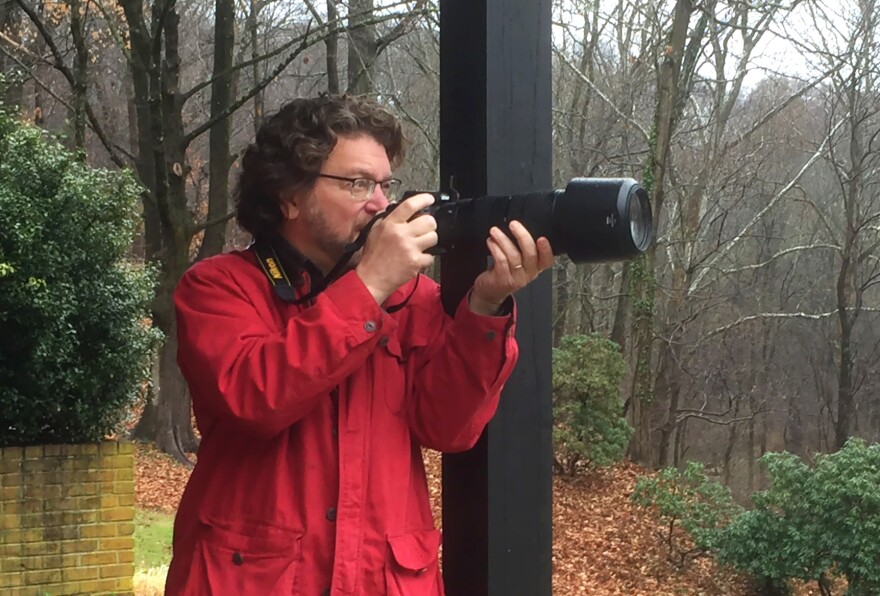Philadelphia composer Kile Smith's many works have been earning him increasing accolades, with recordings and performances around the country and in other parts of the world in the past few years. He's sharing a new virtual piece for choirs during these difficult times, has discovered a love for working outside, and has recently stepped up his game in another form of artistic expression: photography.
Kile checked in with me on Zoom in early October for a TIME IN interview, to talk about how he's been navigating the pandemic with work, and fun, both indoors and outside. Watch the video of our conversation, and see some of Kile's photographs:
The year 2020 started off well for Kile. His work, The Arc in the Sky, recorded by The Crossing, was nominated for a GRAMMY Award for Best Choral Performance.
Also, his piece Canticle was among the recordings that earned Blanton Alspaugh a win for Classical Producer of the Year. Another album, A Birch in Winter, which includes his choral work, Where Flames a Word, won the 2020 Estonian Recording of the Year.
And then came March, when COVID-19 cases surged, and the world shut down. Kile was workshopping parts of his new opera based on the Book of Job at Northwestern University with choirs led by his frequent collaborator, Donald Nally, conductor of The Crossing and also director of choral organizations at Northwestern. "As we finished on Wednesday night, they were shutting the school. I was able to get on a plane [back to Philadelphia] on Thursday. And two days after that—boom—everything was just was buttoned up."
Here are edited excerpts from our Zoom conversation:
After you returned home from Northwestern, and everything was shut down, what was life like at home?
"Being a composer is like the perfect socially distanced profession," he says. "It's you sitting in a room by yourself and writing music. Well, that's what I'd do anyway, whether there's a pandemic or not."
"Although there was actually one piece that came up because of the pandemic," Kile says. He was asked by Trey Davis, conductor of the Louisiana State University (LSU) Chorale and Tiger Glee Club, to write a virtual choir piece on short notice.
A virtual piece has its own challenges. "The idea," says Kile, "was to have one soloist who would sing and everyone would imitate her in their own way. I had everything written out exactly, but it was written out in such a way, so it would sound like it was a little bit off, and it would work that way because with these virtual things, everything's kind of off anyway. And it sounded really good." Here's the video of "Everyone Sang," by LSU Chorale and LSU Tiger Glee Club, conducted by Trey Davis.
It went so well, in fact, that Kile decided to make it available to others for free. "Choirs have been hit hard enough without spending more money. And so I've had over three dozen choirs and conductors take the piece. And it's been performed a few times already. It's been fun."
You compose, which you can do when you're shut in; you write a blog, which you can do when you're shut in; you also do a podcast, Fleisher Discoveries, with stories about music from The Free Library's Fleisher Collection of Orchestral Music. You must have so much music running around in your head all the time!
"Usually, the composing part happens when I sit down in front of the computer to compose. Somebody asked Benjamin Britten one time, 'Do you ever dream music and think about music when you go to bed?' And he says, 'Bed is for sleeping. When I work, that's when I compose.' I thought that's a pretty good answer."
You also love to take photographs; I've seen some of your wonderful photographs from nature, of birds and deer. Has the pandemic changed the balance of your activities?
"Well, the photography predates the pandemic; I liked to take pictures on a very low level with the old film cameras when I was in college and when I was first married. I rediscovered it a couple of years ago. My wife, Jackie, and I would go out to a lot of nature places, and you'll see birds and lakes and it's all beautiful. So I started just taking the iPhone and taking pictures and I thought, wow, I'm really enjoying this."

"I bought myself a kind of middle-of-the road big camera. I got a pretty good lens and started taking pictures. And then I made myself put them up on Facebook, [reasoning that] if I make myself do this, then I'm going to have to choose the ones I really like, and I'm going to have to work on them and make myself get better at the post-production side."
"And then I realized, this is a hobby! I never had a hobby before. This is just terrific! And actually, I have on the back burner, a couple of gallery openings that that should be happening in the not too distant future, with some of my favorite ones that are pretty good. It's been a lot of fun."
Do you have a favorite photograph that you could describe for us?
"We were down in Cape May. I went out to catch the sunrise, which, if you know me, is very out of character, but I thought, yeah, I'm down here, I'm going to go out! I stayed there for a little bit longer. And there's all these birds and sandpipers."

"One photo is just two sandpipers on the beach, but the beach is kind of undulating. After a wave recedes, there's this sheen of water on the sand. The sand is very smooth and there're two sandpipers, one at the edge of the water and one a little bit out of focus further back. It's just the most beautiful thing."
"This is one of my favorite ones. There's a peacefulness about it."
So in your photography, you're drawn to nature. Does that appear in your music at all?
"I did an unusual project with Piffaro and Orchestra 2001 a few years back. They said, we want you to write a piece that both groups will play. I thought, okay, fine. What's the piece going to be? "
"And then this happened: We saw a hummingbird chase a hawk! Jackie and I were sitting on the porch and wham, this hawk just lands in this holly bush right next to us, like 10 feet away!"

"And the hawk is doing this," he demonstrates a twitching motion with his arm. "And then we see there's this hummingbird, who's attacking this hawk! Hummingbirds are nasty and they don't take guff from anybody."
"This goes on for a couple of minutes. And then the hummingbird takes off and the hawk chases the hummingbird. It's the wackiest thing I ever saw. And then it happens again! They come back to the same place around three times! And I thought, there's a piece in there somewhere. So I wrote Red Tail and Hummingbird.
Here's a performance of Red Tail and Hummingbird, arranged for quintet and performed by Philadelphia Brass:
Some people have said that during the shutdown, they notice more things when they're outside.
"Well, it's absolutely true," he says. "And it brings up something else that I'm doing a lot of now, which I hadn't been, and that's working outside in the yard. We're living in a new house, and there's a good bit of a land that I'm having to take care of."
"I go out in the afternoon and I work in the yard. There are lots of limbs that are falling down that need to be cut up. There's a lot of poison ivy that I'm pulling out."
"Well, what happens is, when you're outside, you notice things. So you notice birds you hadn't seen before. You'll hear things and you'll think, oh, I know that sound. I should know what that bird is, because it's a recognizable sound. So you stop what you're doing and look, and you'll say, oh, it's just a cardinal, or it's a bluejay, just kind of regular birds, you know, but then you'll see other things."
"I saw a yellow-bellied sapsucker!" he exclaims. "Who knew that there were yellow-bellied sapsuckers around?"

"And Jackie and I were walking out on the Pennypack Trail, and I saw what birders call a 'life bird.' The first time you see a particular bird, you call it your life bird. So I saw a yellow-billed cuckoo in the woods. It's about the size of a robin, maybe just a little bit smaller and slimmer."

So have you started doing anything that you'll continue when the world opens up again?
"I hope I continue working on the yard and the land around here and making it a little bit more presentable. I really enjoy doing that; it's actually a lot of fun. Also, it's not brain surgery, you know, when you're ripping up or pulling down poison ivy off of trees. Your mind can think about other things while you're doing it."
"I think it's a reason that a lot of people put down in their bios: also likes gardening. I could see the appeal of that. So that's been real nice. I hope that continues." Check out Kile's website here.
More TIME IN interviews with Host Susan Lewis are here.



